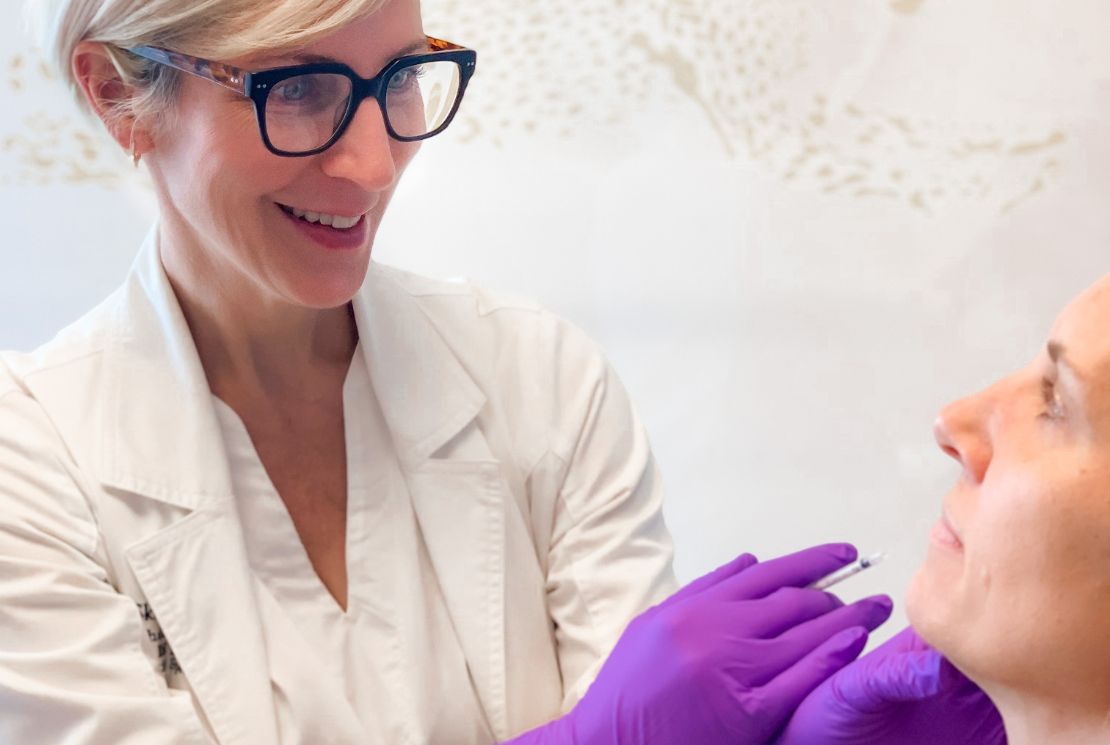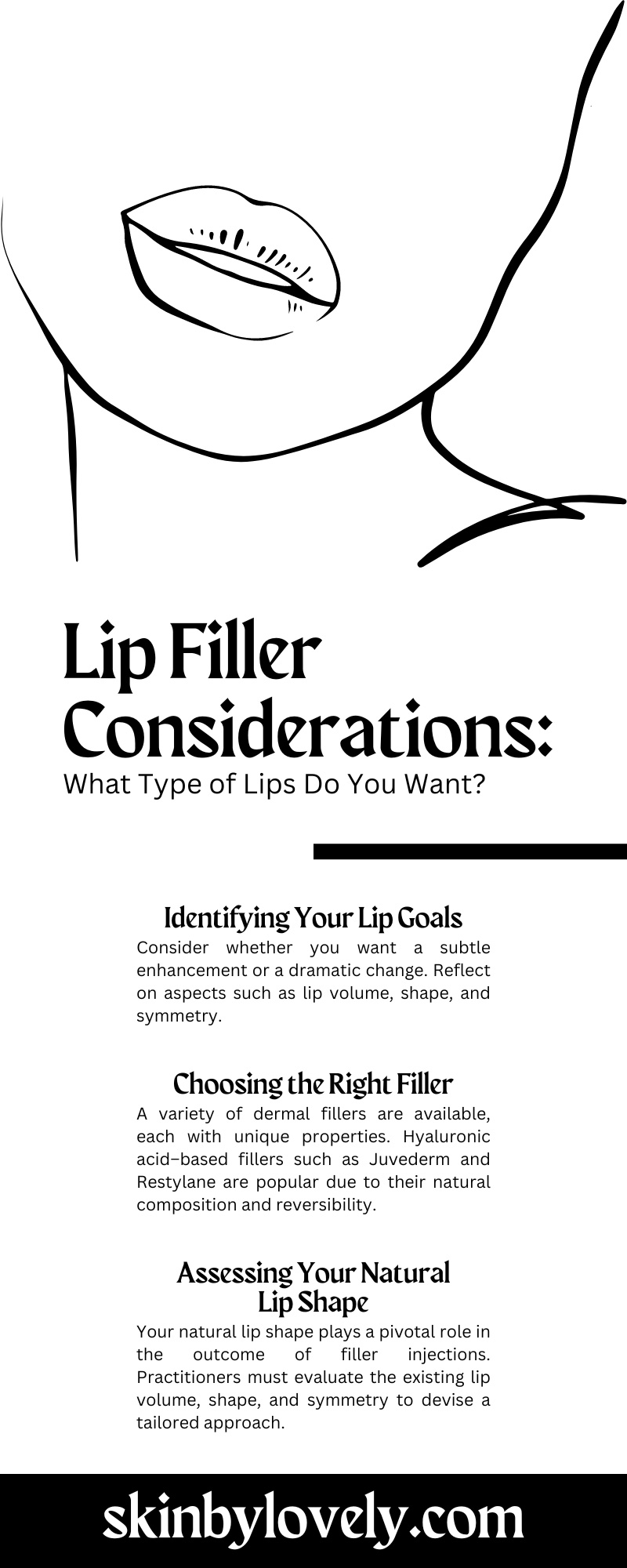Camas, WA
Injectables
Skin Rejuvenation
Hair Restoration & Growth
Shop By Category

In the realm of cosmetic enhancements, lip fillers stand out as popular choices for people seeking to augment their lip volume and shape. This comprehensive guide covers all the lip filler considerations you should know, including the right filler for the type of lips you might want. From lip anatomy to post-treatment care, we cover everything you need to know to achieve your desired lip appearance.
Before you explore lip fillers, understanding the anatomy of your own lips is crucial. The lips are composed of several key areas: the Cupid’s bow at the top, the vermillion border defining the lip’s edge, and the fleshy, visible part of the lip known as the tubercle. Each area contributes differently to the overall shape and appearance of your lips. A thorough understanding of these components is essential for tailoring filler injections to achieve a balanced, natural look.
Determining your goals is a fundamental step in the lip-filler journey. Consider whether you want a subtle enhancement or a dramatic change. Reflect on aspects such as lip volume, shape, and symmetry. Some people might aim for a fuller pout, while others may simply wish to correct asymmetries or fine lines around the mouth. Clearly articulating these goals to your practitioner ensures the treatment plan will align with your expectations.
A variety of dermal fillers are available, each with unique properties. Hyaluronic acid–based fillers such as Juvederm and Restylane are popular due to their natural composition and reversibility. These fillers can provide volume, shape, and structure, depending on the specific product and technique used. Discuss with your practitioner the most suitable filler type based on your lip structure, desired outcome, and any potential allergies or sensitivities.
The outcome of lip fillers heavily depends on the expertise of the practitioner. Make sure you choose a licensed professional with extensive experience in dermal fillers. A qualified practitioner not only understands the technical aspects of the procedure but also has an aesthetic eye for creating natural-looking results. They should also provide a comprehensive consultation to discuss your goals, assess your facial structure, and explain the procedure in detail.
Your natural lip shape plays a pivotal role in the outcome of filler injections. Practitioners must evaluate the existing lip volume, shape, and symmetry to devise a tailored approach. For instance, thin lips might require a different technique compared to naturally fuller lips. Understanding the starting point helps in setting realistic expectations and achieving a result that enhances your natural features.
Having realistic expectations is essential when you’re considering lip fillers. Fillers can significantly enhance the appearance of your lips, but there are limitations based on your natural lip anatomy and the properties of the fillers. It’s important to have an open, honest discussion with your practitioner about what they can realistically achieve.
Symmetry is often a desired goal in lip filler treatments, but recognizing that absolute symmetry is rarely achievable is important. Minor asymmetries are natural, and they can even contribute to an individual’s unique beauty. The aim should be to enhance your lips in a way that complements your overall facial symmetry.
The technique used during the injection process significantly affects the results. Practitioners may use different methods, such as linear threading, fanning, or cross-hatching, depending on the desired effect. These techniques target specific areas of the lips and achieve certain outcomes, from creating volume to defining the border. The practitioner’s skill and understanding of these techniques are crucial for a successful outcome.
The effects of lip fillers are not permanent, with results typically lasting between six months to a year. Factors such as the type of filler used, your metabolic rate, and lifestyle can influence their longevity. Regular maintenance sessions are necessary to preserving the desired appearance. Discuss with your practitioner the expected duration of your fillers and the schedule for potential touch-ups.
Lip fillers are generally safe, but they come with potential risks and side effects. Common side effects include swelling, bruising, and tenderness at the injection sites. More severe complications, though rare, can consist of allergic reactions or vascular occlusion. Discussing these risks with your practitioner and understanding the safety measures and protocols in place are crucial.
Preparing for a lip filler procedure is an integral part of ensuring an optimal outcome. Proper preparation can lead to a smoother procedure and recovery. In the days leading up to your appointment, it’s advised to avoid any medications or supplements that could increase the risk of bruising and bleeding, such as aspirin, ibuprofen, fish oil, and vitamin E supplements.
You should also avoid alcohol consumption for at least 24 hours before the procedure. Hydration is important, but avoid excessive fluids right before the procedure to reduce swelling. Adhering to these pre-procedure instructions can minimize potential side effects and contribute to a smoother treatment experience.
Effective aftercare is crucial for the success of your lip filler treatment. Post-procedure, you may experience swelling, tenderness, and sometimes bruising around the treated area. To minimize these effects, apply ice or a cold compress intermittently for the first 24 hours.
Avoid touching or pressing your lips excessively, and refrain from strenuous exercise for a day or two to reduce swelling. Your practitioner might also advise avoiding extreme temperatures, such as saunas or very cold environments. Following these aftercare guidelines diligently can speed up the healing process and maintain the integrity of the filler.
The final step in your lip-filler journey involves choosing the right dermal fillers. With various options available, each offering different textures and longevity, making an informed decision on the type of filler is important. Discuss with your practitioner using fillers that provide a natural feel and that are well-suited for your lips, such as those containing hyaluronic acid. These fillers are preferred for their safety profile, reversibility, and natural-looking results. Ensure the products used are FDA approved and sourced from reputable manufacturers. Your practitioner’s expertise in selecting and administering the right filler is crucial for achieving your desired outcome.
Now that you know these lip filler considerations and the type of lips you want, it should be clear that getting the look you want involves a series of informed decisions and considerations. By understanding these nuances and working closely with a skilled practitioner, you can ensure your lip-filler journey is a successful, satisfying experience.
